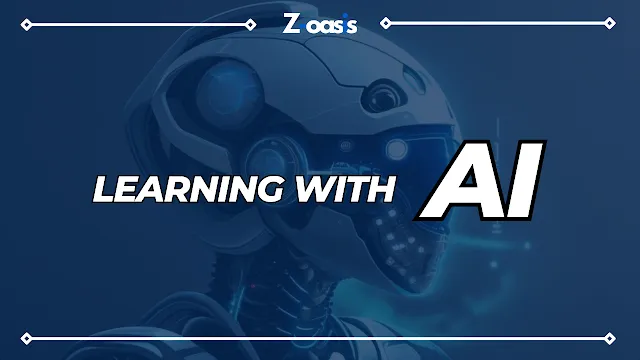Adaptive learning systems mark one of the most significant breakthroughs in the field of education, thanks to artificial intelligence (AI). Tailor-made educational experiences are no longer a dream with these systems, which harness the power of AI algorithms to customize the educational journey for each student.
By studying patterns in a learner's performance and behavior, these systems pinpoint their strong and weak areas, giving them targeted support to improve their skills and understanding.
 |
| Personalized Learning with AI |
The Inner Workings of Adaptive Learning Systems
The mechanism of adaptive learning systems involves machine learning algorithms that collect and assess data on each student's performance. This extensive data pool includes details, from test scores and homework compliance rates to the time invested in specific tasks. A thorough analysis of this data aids in sketching a detailed profile of a student's particular learning style, and preferences, as well as their struggle zones in academia.
This unique profile then formulates personalized learning routes for each student. These learning routes are devised to deal with the specified needs and learning objectives of each student. For instance, if a student finds a specific concept challenging, the system can extend additional resources like instructive videos or interactive exercises to aid their understanding.
As the student advances on their learning journey, the system continues to watch over their progress, tweaking the content and difficulty levels as needed. If a student is acing an area, they're offered more rigorous tasks to keep them stimulated and driven. Conversely, if they are facing hurdles with a concept, the system amplifies support to help them conquer their obstacles.
Why Engage with Adaptive Learning Systems
Adaptive learning systems are not just remarkable for their innovative approach but they also propose numerous benefits for students and educators alike. Here’s a look at some key advantages:
- Bespoke Learning Experience: These systems enable each student to have a learning experience specifically tailored to their needs. This not only facilitates effective and efficient learning but also lets students focus on areas where they require further practice, along with access to additional support as needed.
- Boost in Engagement: By creating interactive and dynamic learning materials, adaptive learning systems enhance student engagement and motivation levels. Even fun elements of gamification, such as leaderboards and rewards, are incorporated to spice up the learning process.
- Positive Impact on Learning Outcomes: Research indicates that adapting learning systems tends to impact the overall learning outcome positively. By providing personalized guidance and support, these systems facilitate deeper comprehension for students and boost their academic performance.
- Efficiency in Time and Cost: With tasks such as grading and feedback automated, it makes the instruction process not only time-efficient for educators but also cost-efficient since individualized instruction can be delivered to numerous students simultaneously.
Potential Hitches in Adaptive Learning Systems
Even though adaptive learning systems are promising, they aren't completely devoid of challenges:
- Data Protection: Given that these systems are wholly dependent on vast amounts of student data, securing this data and protecting student privacy becomes essential.
- Equality and Accessibility: It's also vital to keep an eye out for possible exacerbations of existing educational inequalities. After all, not everyone has equal access to the prerequisite technology or internet connectivity for these systems.
- Teacher Training: Implementing adaptive learning systems successfully requires educators to be well-versed with the technology and how it integrates into their teaching practices. Adequate professional development and consistent support become crucial here.
- Ethics Check: Lastly, just as with any artificially intelligent tool, ethical considerations play an enormous role. Designing and executing such systems demands utmost carefulness to avoid impacting students negatively.
In conclusion, adaptive learning systems, though a significant boon, pose a fair share of challenges. They allow for more personalized, engaging, and impactful learning experiences. Yet, due consideration must be given to data security, equal opportunity, teacher training, and ethical practices to ensure these systems are responsibly and inclusively implemented.